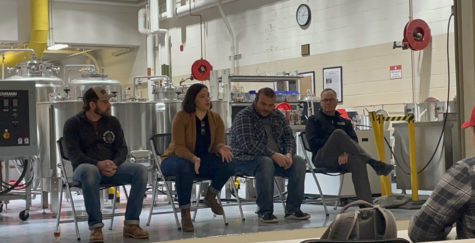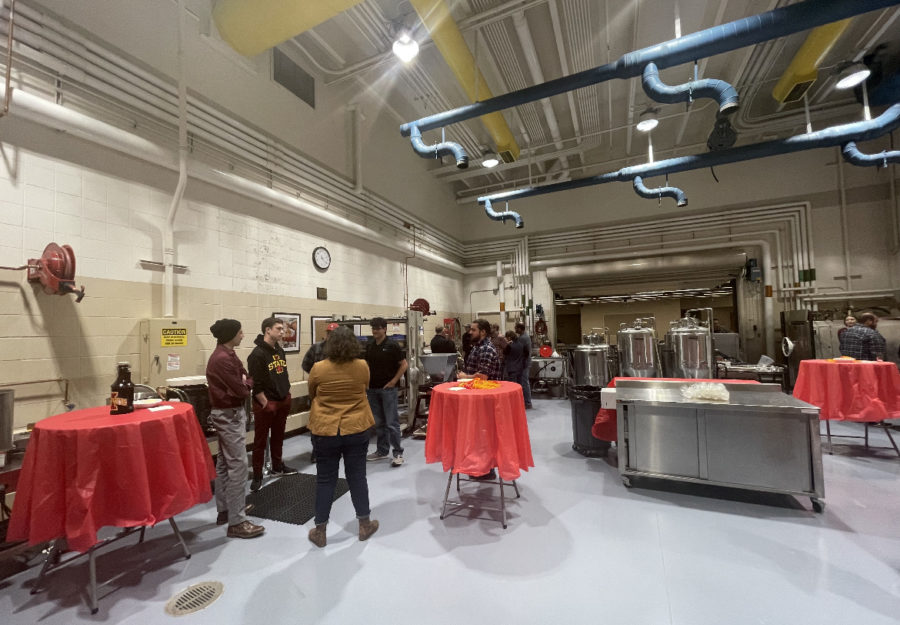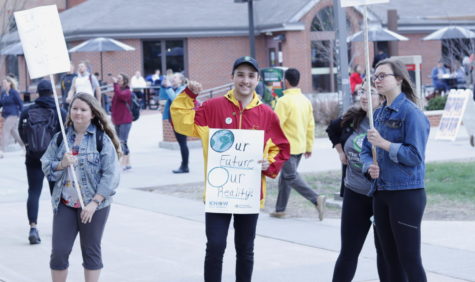Students wrap up semester of brewing
Students in the Science and Practice of Brewing course pictured in the laboratory.
Students who spent the semester learning about the science and practice of brewing had the opportunity to meet experts at the end of their course.
On Tuesday, the panel of brewers spoke to the students of FS HN 273X/ME 273X: Science and Practice of Brewing about their experiences as homebrewers and how they started their brewing careers.
The panelists were:
- John Blichmann, a mechanical engineering alumnus and owner of Blichmann Engineering. Blichmann also donated equipment for students to use for the course.
- Andy McCormick, owner of Torrent Brewing in Ames.
- Kathryn (Klaes) Lee, founder and owner of Guttenberg Brewing Company.
- Keaton Scott, master brewer of Big Grove Brewery in Des Moines.
FS HN 273X/ME 273X: Science and Practice of Brewing is a three-credit course that includes an hour and a half of lectures and four and a half hours of labs each week. According to a College of Engineering Newsletter, students must be 21 years old and complete alcohol server training before being allowed into the laboratory.

Trevor Finley, a senior in mechanical engineering, had no prior brewing experience before taking the course. Finley said, like all lab courses, there’s a learning curve, and there will be challenges students encounter along the way. Students work with different machine systems throughout the brewing process and the semester. One challenge Finley has come across was getting used to the system and the overall process.
“There are challenges with not knowing exactly what we’re doing and just constantly asking questions,” Finley said. “So, it’s kind of like, sink or swim, just kind of get thrown in the water. And I mean, you’re asking questions constantly on what to do, and then obviously, being new, you’re gonna make mistakes.”
Robert Brown, a distinguished professor in mechanical engineering, the professor of the course and a brewer himself, said that students learn a lot of value in taking the course. It is unlike any other lab you’ll typically see. Brown believes that there is more to the course than just what meets the eye.
“The course actually represents some hands-on experience,” Brown said. “More and more students do not get those experiences. The typical lab course they’re going to is all set up for them. In here, they actually come in and nothing’s ready to go.”
Brown said the course presents students with a very independent project. He said students have to figure out what they need to make, how to combine gradients and what templates to work with.
“I think we’re teaching students the health and safety of brewing and consuming alcohol,” Brown said. “So, I think it also teaches responsible consumption and understands the issues of excess alcohol consumption. It’s not a party; it is a matter of them learning how to sample beer, appreciating the characteristics of flavor, color and aroma.”
Paulo Fortes-Da-Silva, adjunct assistant professor in food science and human nutrition and the assistant professor for the course, said that there is another value to the course — failure.
Silva said it is important to learn from failure; what matters most is how you can learn from it and what you will do to put yourself back on track. He stressed the importance of responsibility and what students can do to improve themselves, so they don’t make a similar mistake the next time.
“They see their own failure on the goal they set out to achieve from the beginning,” Silva said. “It takes a whole semester for them to see failure. But with that, that journey would bring them to learn how to be humble, how to see where they made mistakes.”
Silva said that students have the resources that enable them to look back and see where they messed up and what they can learn from it. That, in turn, enables students to “readjust their sails and navigate the direction they want to go.”
Andrew Dorang, a senior in chemical engineering, has had prior brewing experience, but even he started off making mistakes with his first brews “going down the drain.” Dorang said he has since improved much over a year and a half; however, he still made mistakes in the course.
“Don’t be afraid to fail,” Dorang said. “I’ll be honest, that was kind of a big learning experience for me because I’m like, ‘Okay, what do I do wrong? How do I fix it?’ And that kind of gave me at least troubleshooting, then. Of course, during my time here, I made mistakes in the lab, as it had been one of the barriers, and it’s just learning how to kind of overcome those issues and make something enjoyable.”
Your donation will support the student journalists of the Iowa State Daily. Your contribution will allow us to purchase equipment, send our student journalists to conferences and off-set their cost of living so they can continue to do best-in-the-nation work at the Iowa State Daily.















Nancy Anker | Jan 17, 2023 at 9:18 am
Loved reading the brewing story. My son, a former ISU football player, owns a small nano brewery in Winterset Iowa. He represents the home brewer living the dream of brewing on a larger scale. Google “1st Down Brewery” and you can read his story. Both he and his wife are ISU graduates. Sam and Missy Anker